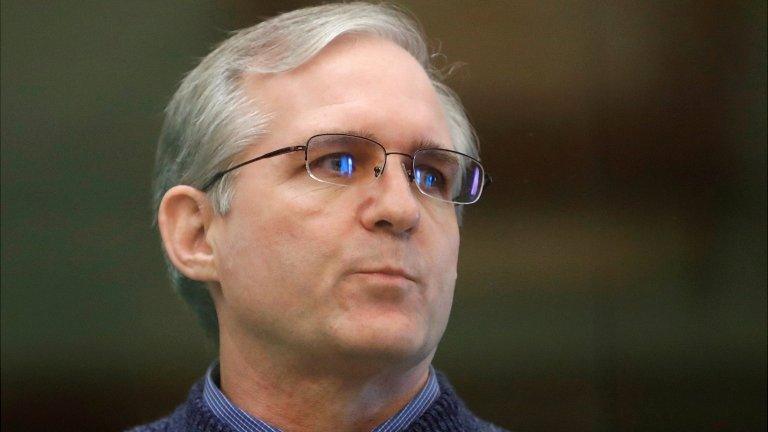Paul Whelan: The strange case of the ex-marine jailed for spying in Russia
- Published
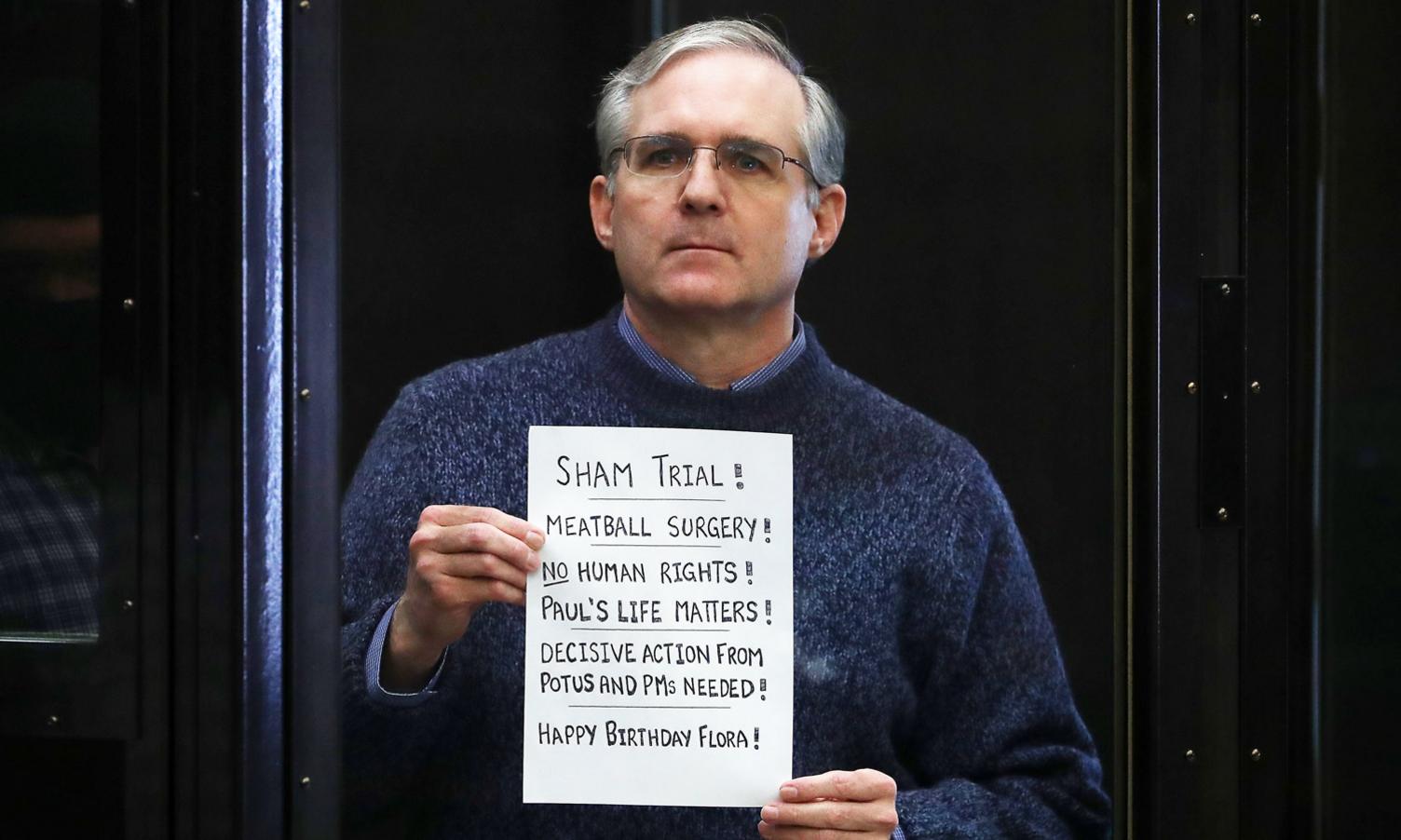
In Room 3324 of Moscow's Metropol hotel, Paul Whelan was getting dressed for a friend's wedding when Russian intelligence officers burst in.
The American disappeared without trace for three days until his twin stumbled across a news report announcing that his brother had been charged with espionage.
That was New Year's Eve 2018 and the start of a case that would embroil four western governments and pile pressure on relations with Russia that had already sunk to a post-Cold War low.
Almost 18 months later, Whelan has been convicted of spying - receiving Russian state secrets - after a short trial conducted entirely behind closed doors.
The former US Marine - who also has British, Irish and Canadian citizenship - has always insisted on his innocence, and in court this week he described himself the victim of "greasy, slimy Russian politics".
As his family step-up their appeals to bring him home, officials in Moscow are already hinting at a possible prisoner swap adding to suspicions that the man from Michigan is a pawn in a political game that has yet to play out.
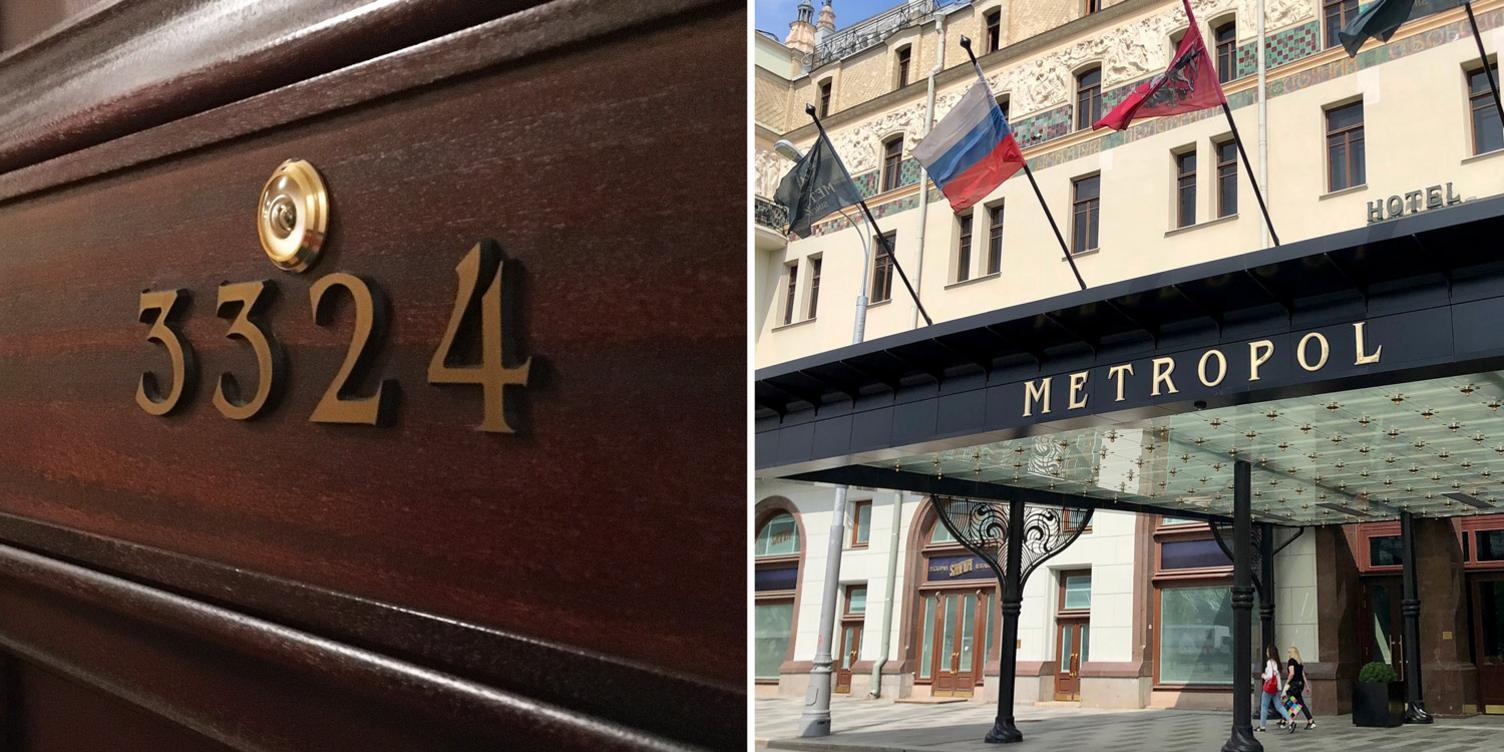


Tough Justice
On 15 June, it took the chief judge just 1 minute 20 seconds to reach the key words in his verdict.
"Moscow City Court…finds Paul Nicholas Whelan guilty," he read from the typed sheet, adding that the 16-year sentence would be served in a high-security facility for the most dangerous offenders.
The judge then turned to address the defendant, who was standing in a glass cage guarded by two FSB security officers in black balaclavas. Watching from the wooden courtroom benches, socially distanced and in medical facemasks, were the ambassadors of the US, UK and Canada.
"Whelan, do you understand the sentence?" he asked.
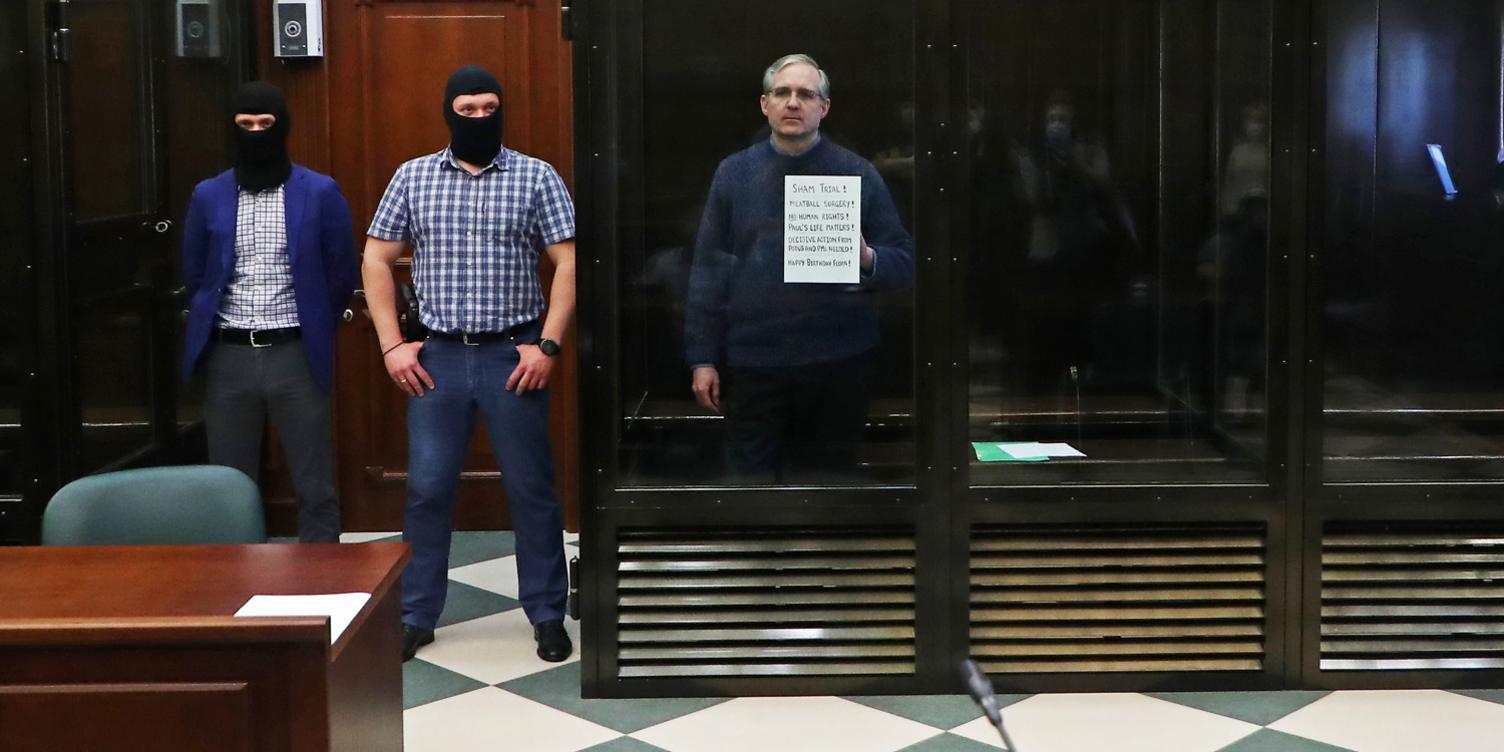
Paul Whelan's sentencing in court
The American, whose glasses, side parting and blue sweater that he wore to each court appearance gave him the look of a neat, middle-aged librarian, looked back at the judge blankly.
His Russian wasn't up to this.
"Nothing's translated, Your Honour," the 50-year-old protested, sending an interpreter scurrying over to explain his fate. The three judges swept off the podium and out of court.
It was a flat, abrupt end to a spy trial that had taken just a handful of closed hearings. Moscow's Covid-19 lockdown had cloaked proceedings in an even thicker layer of secrecy, with both press and public barred from the building right up until the final verdict.



James Bond or Mr Bean?
The first time I saw Whelan in court, well over a year ago, he arrived with a weak smile and a brown cardboard box hugged to his chest containing a packed prison lunch. He was flanked by FSB guards, faces covered so they couldn't be identified.
State TV crews, hovering for their shots in the hallway, were already referring to the accused man as "the American spy".
Paul Whelan would be brought for multiple custody hearings and appeals over the months and we squeezed in almost every time. Although we were only allowed to attend for the opening remarks, we managed to snatch several conversations with him.
That first day, though - in a cage, with a dozen cameras trained on him - he looked tense and spoke little.
Almost two months had passed since his arrest, and he said he was coping "fine". But when I asked for his side of the story, his eyes flicked towards the guards. "If I do that, I'll be in a bad way," Whelan told me, warily. "They don't want me to speak with you."
A member of his defence team has since revealed that he was coming under intense pressure from the FSB to confess, interrogated several times without his lawyers present.
"[They'd say] things like, 'There's no hope for you, tell us the truth. You're a spy, you'll be convicted,'" Olga Karlova told me last summer.
The American refused and as his time in custody was extended repeatedly, he gradually grew bolder in court.
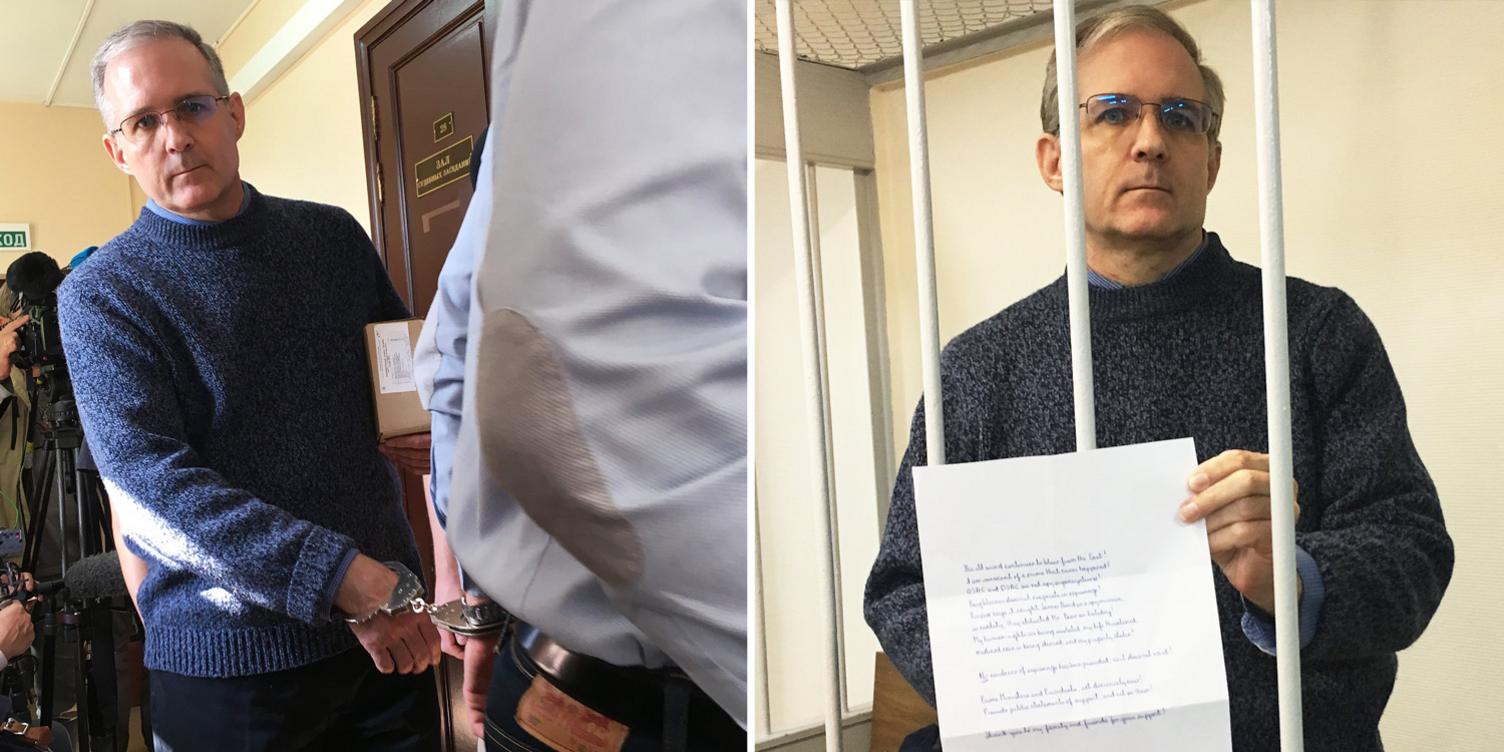
Paul Whelan arrives handcuffed and holds a personal statement up in court
Whelan, who at the time of his arrest was the head of global security for a US-based car parts firm, began to denounce the charge of espionage as "ridiculous", and declare that he was being tried by a "kangaroo court". He'd prepare a speech for each session, writing it out on a sheet of paper vetted and stamped by the prison censors.
"Russia says it caught James Bond on a spy mission," Whelan announced one day, as we waited for the judge. "In reality, they abducted Mr Bean on holiday."
By then, we'd learned that the American had visited Russia multiple times. On his latest trip, in December 2018, he was in Moscow for the wedding of a fellow ex-Marine to a Russian woman. But Whelan never made it to the ceremony. He was arrested in his room, just hours after showing some of the other wedding guests around the grounds of the Kremlin.
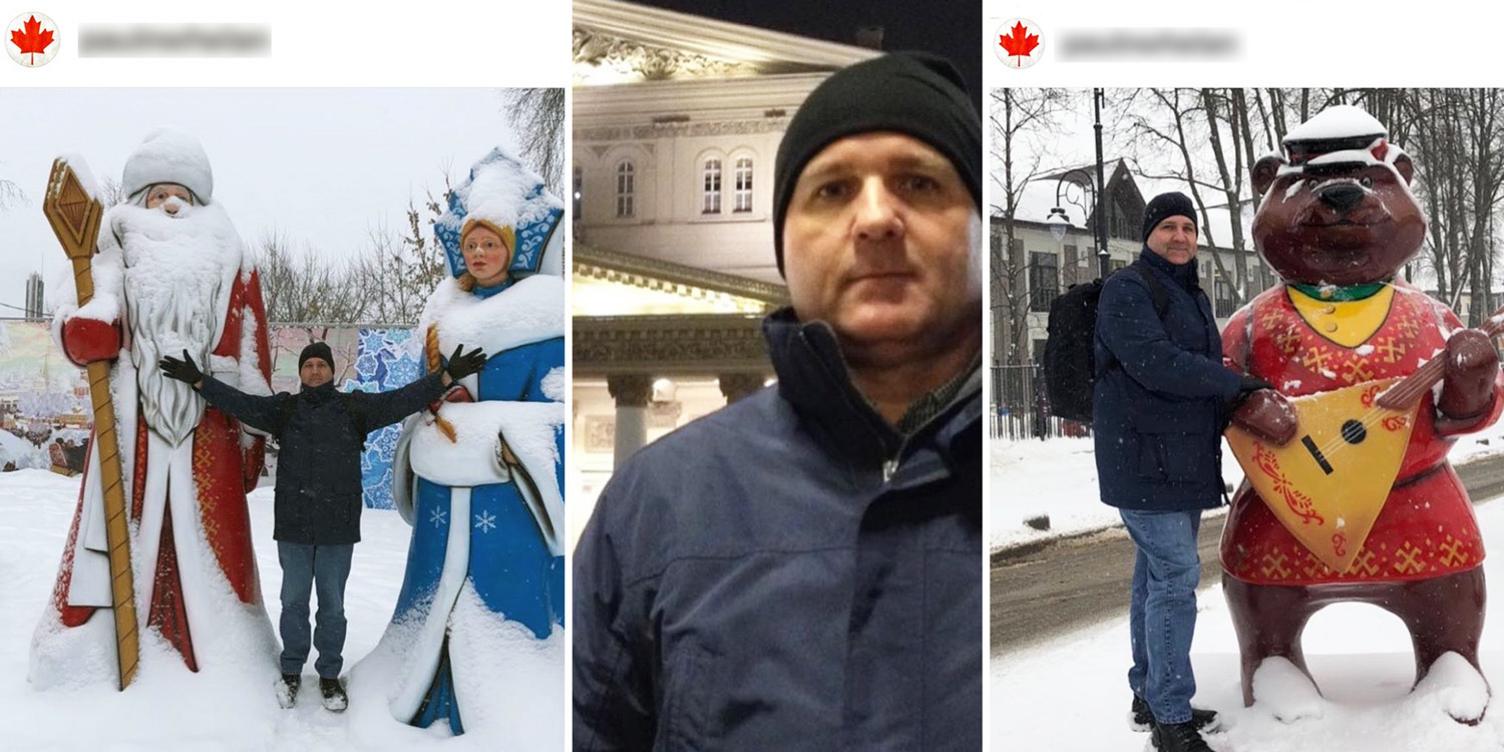
Paul Whelan's Instagram posts
So, at a court hearing late last year, I raised my voice over a wall of bailiffs to ask him once again what had happened.
He paused a little, before calling back.
"I'm not allowed to give you details, but I can tell you I was set-up. I did not commit a crime," Whelan said, telling me that a friend had turned-up at his hotel that evening unannounced.
When Whelan was arrested, the FSB found a USB drive in his pocket containing the classified information it alleges he had requested. He now told me his friend had planted the device in his pocket, without him realising.
"That person was an FSB officer. He's someone I've known for ten years," he revealed for the first time.
"There's absolutely no reason he should have been in my room and no reason he should have given me any sort of device."
When the judge returned to court, to extend his stay in prison once again, Whelan's frustration erupted.
"I can talk louder than you, Your Honour," he shouted from the cage. "As my cousins in England would say, this is complete bollocks."
At that, the judge ordered the TV cameras to be removed from court. Filming was barred at all future hearings to stop the press capturing any more protests.



'Red-handed'
The Russian government declared Paul Whelan guilty long ago.
Just two weeks after his arrest, Foreign Minister Sergei Lavrov declared that the American had been caught "red-handed" conducting a "concrete, illegal act".
The case was immediately big news that grew further when it emerged that Whelan was a citizen of four countries.
Born in Canada to British parents of Irish heritage, he later moved to the US entitling him to multiple passports as a result.
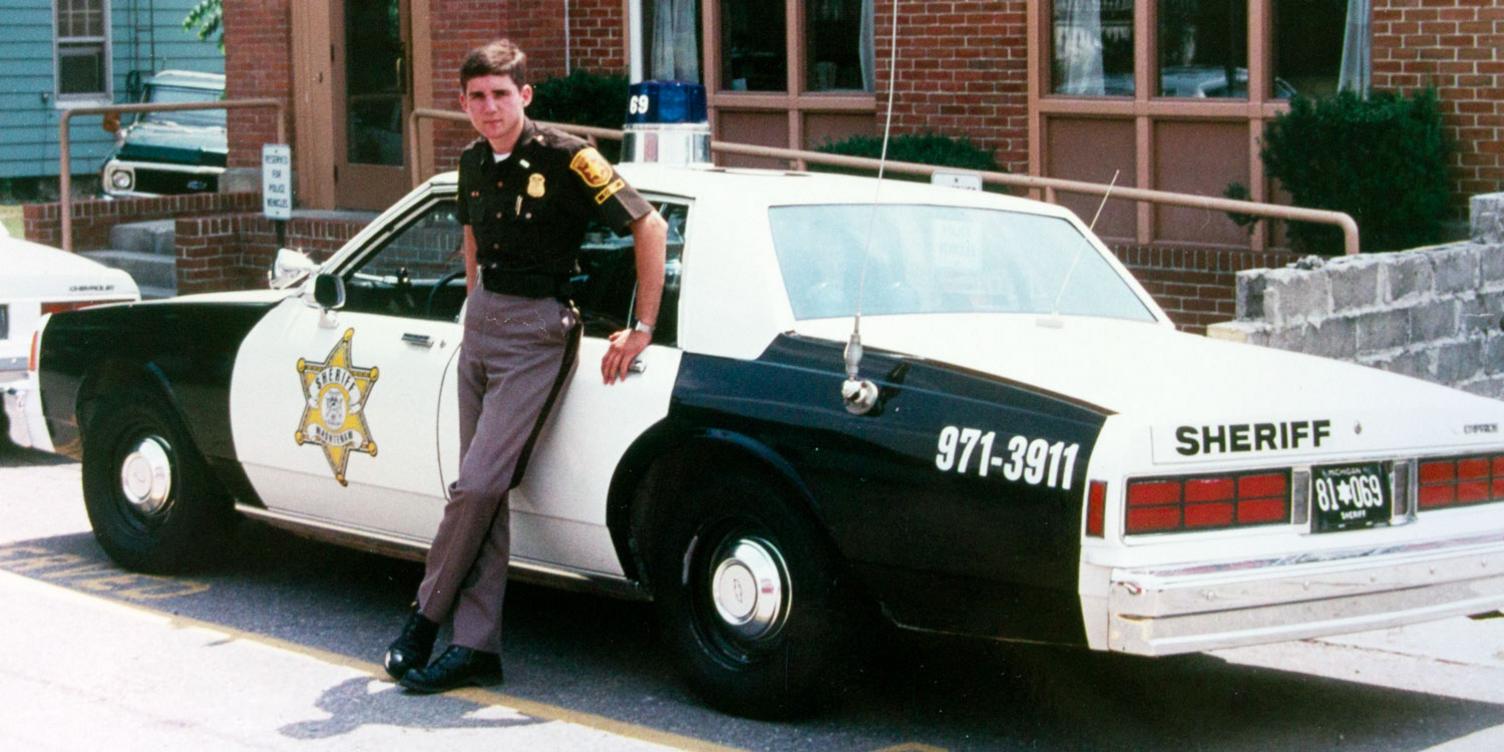
Paul Whelan was a US police officer when he was younger
In early 2019, the drama of his now multi-national arrest was developing against a hostile political backdrop, with mutual sanctions over the Ukraine crisis and East-West tension not felt since Soviet times.
Nine months earlier, the UK had accused Russia of poisoning Sergei Skripal, a former double-agent, on the streets of Salisbury. At the same time, Washington was still accusing Moscow of meddling in its elections.
So when Whelan's plight became public, there was speculation that he could be the human collateral.
The FSB was already dripping details of the case it would make in court.
The Russian Rosbalt news agency quoted a source claiming that Whelan was working directly for US intelligence, tasked with obtaining a list of personnel at "one of Russia's secret institutions". It said that information was the object of "intense interest" to the Americans, and that Whelan had been cultivating potential contacts, online, for over a decade.
Spy trials in Russia are not only heard in secret, the defence lawyers have to sign non-disclosure agreements covering the entire case. So no evidence - the wire taps or surveillance footage the case is reportedly based on - has been made public.
In Whelan's case, there's the added nuance that his defence team were appointed and paid for by the Russian state. His family decided not to change them, reasoning that a bill of over $150,000 (£121,000) was "an awful lot of resources for what would have been zero impact".
"Secrecy, provocation and falsification, that's the arsenal of our opponents," says Ivan Pavlov, a human rights lawyer who has gone up against the FSB in many espionage cases.
He mostly represents Russians accused of selling secrets to the West and says the number of such cases has grown significantly since the political climate turned cold again in 2014.
The lawyer warns that the FSB is the "mightiest secret service, not only in Russia," and uses its own experts to examine any evidence for the court.
"If you've got mixed up in something like this, then you're in the most complicated story of your life," Ivan Pavlov says. "It will be very difficult to mount a defence."



The Russia connection
Paul Whelan's travels in Russia began more than a decade ago.
"This is 'Lubyanka' where the KGB has our spies locked in the basement!!", he joked in 2007 on a personal website.
The image was of the headquarters of Russia's notorious security services, now known as the FSB.
Eleven years later, its officers would drive him there for interrogation.
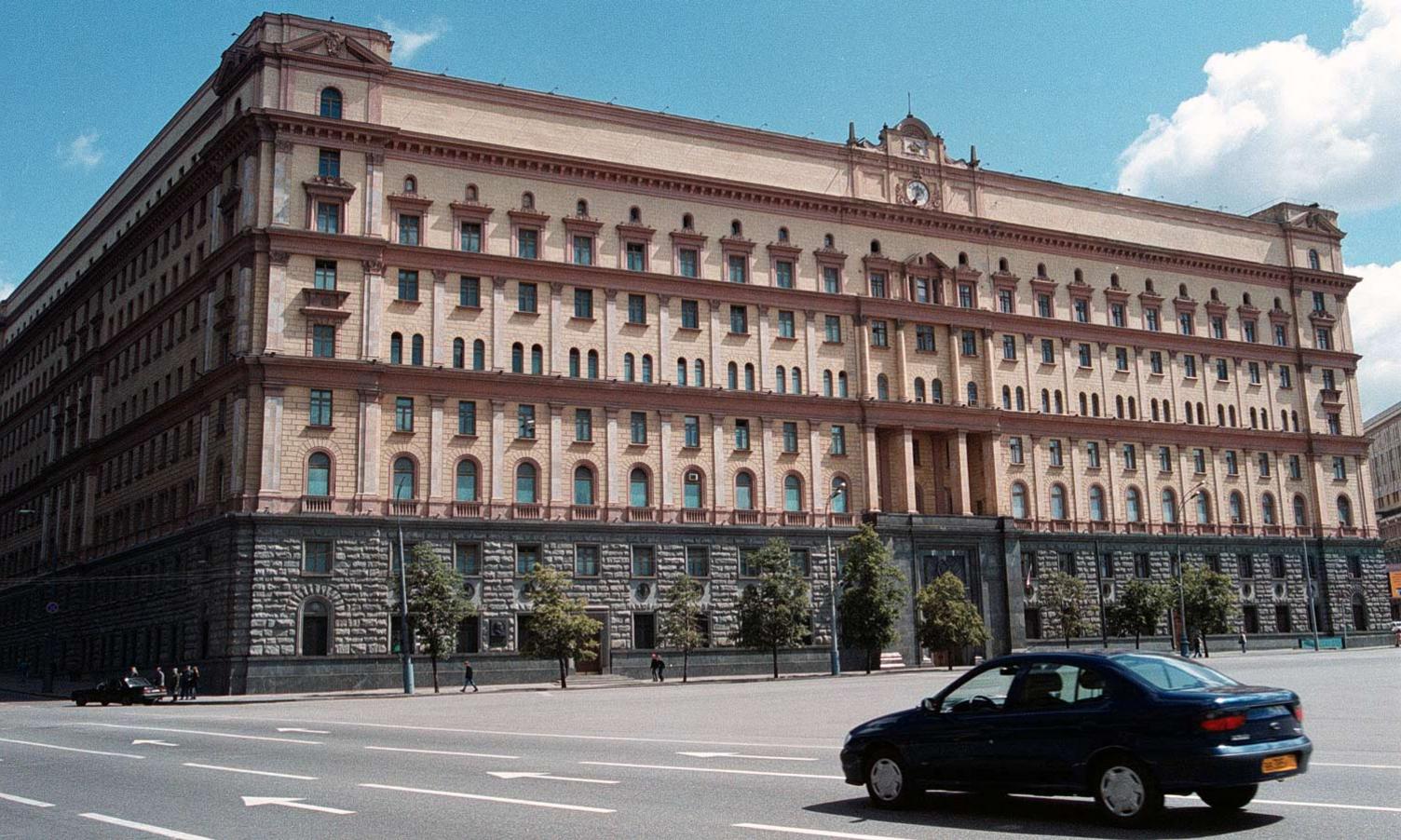
Lubyanka, FSB headquarters in Moscow
The photograph dates from Whelan's first trip to Moscow, made while he was serving with the US military in Iraq. That year he told a Marines news site that he'd taken advantage of a programme that funded a two-week break abroad for those on long deployments.
Whelan had plumped to visit Russia, explaining that, for a "single man like me" the scheme was "an opportunity to travel throughout the world…and experience the diversity of culture".
Since his arrest, the Marine Corps has disclosed that he was discharged in 2008 for bad conduct, a revelation that "absolutely stunned" his twin brother David.
"He was always absolutely positive about the [Marines] experience. There's a Marines' flag flying right below the American flag on my parents' property the whole time," David told the BBC from Canada.
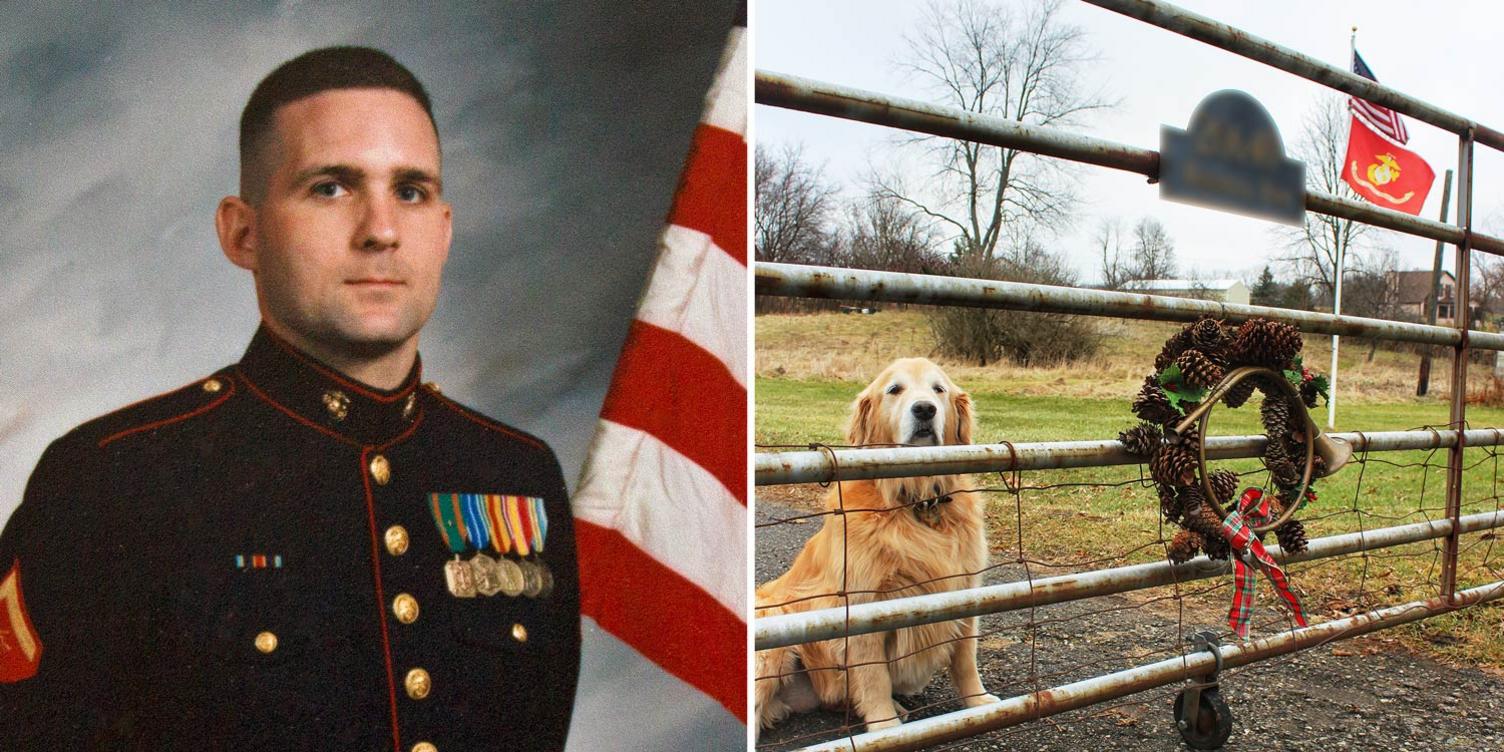
Paul Whelan as a US marine and the front gate at his parents' property
And yet, unknown to those closest to him, Paul had been court-martialled for trying to steal more than $10,000 from the US government.
It was with this scandal breaking behind the scenes, that he first headed for Moscow.
"Having grown up during the Cold War, it was a dream of mine to visit Russia and meet some of the sneaky Russians who had kept the western world at bay for so long!!" Whelan joked back then on his website, which has since been archived.
Its pages document the trip with shots of tourist spots and captions laden with exclamation marks.
A decade later, he would message home regularly from trips to Russia displaying similar almost child-like wonder at new discoveries.
The website content does support later descriptions of Paul Whelan by contacts, colleagues and family as an enthusiastic world traveller who "made friends pretty much everywhere" and had an interest in Russian culture.
"I remember making small talk once and I said, 'You travel a lot for work, where do you travel for fun?'," a former colleague, Skotti Fietsam, told the BBC. "He said Russia!"
She recalled her surprise at his reply.
"He said it's beautiful and he liked the cold and he had quite a few friends there."
An entire section of his old website is dedicated to the cute cartoon character Cheburashka, describing the big-eared, wide-eyed creature as "one good thing to come from the Soviet era". Another link leads to a homemade guide to the Cyrillic alphabet and some basic first words in Russian.

Cartoon character Cheburashka
The pages also reveal his first friends in the Russian military.
Russia would later insinuate, via anonymous sources quoted in the press, that the CIA had selected candidates for Paul Whelan to cultivate for intelligence. It was noticeable, one such report said, that he chose only to befriend men and not "pretty Russian girls".
Whelan was friends with young servicemen in the US, though, too. His website describes his "respect and admiration" for three Naval Academy graduates who'd just joined the Marines.
And he didn't hide his interests and encounters.
In 2009, he took his own parents to visit Russia, where they've told me they met several of his young friends in military uniform.
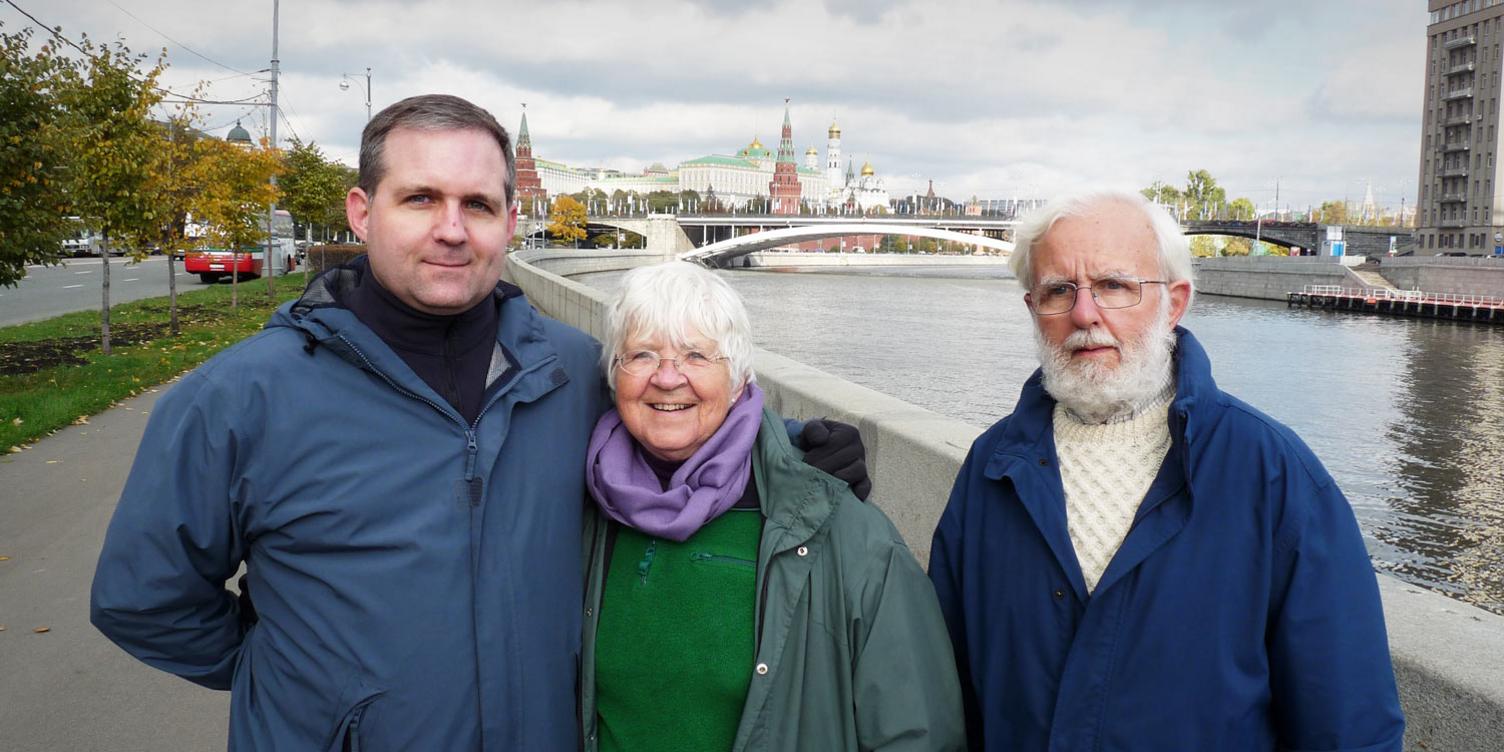
Paul Whelan with his parents in Moscow
Meanwhile, the front page of his website invited visitors to click on the image of a young Russian soldier to learn more about his "hobbies and military service". The link led to Maxim, who explained that his new friend, Paul Whelan, was helping with his English which he planned to study at university.
The Russian described the two spending several days "touring Moscow" together, eating sushi and caviar-filled pancakes.



'Nothing suspicious'
Whelan went on to seek out more Russian friends, using the country's social networking service VK among others.
A scroll through their profiles, soon after his arrest, revealed almost all to be men - most considerably younger than him. Some do have clear military connections - including photographs in uniform - though not all, and no-one who replied to my messages had seen any reason to doubt Whelan's motives.
One replied to tell me he'd been a student and supermarket night-guard when the American first made contact. The two met in person for a few hours in 2008 when Whelan was touring Russia, visiting multiple friends in various cities.
"I don't believe that Paul is a spy," the man wrote to me. "I… don't know anything what [sic] might be interesting to foreign spy."
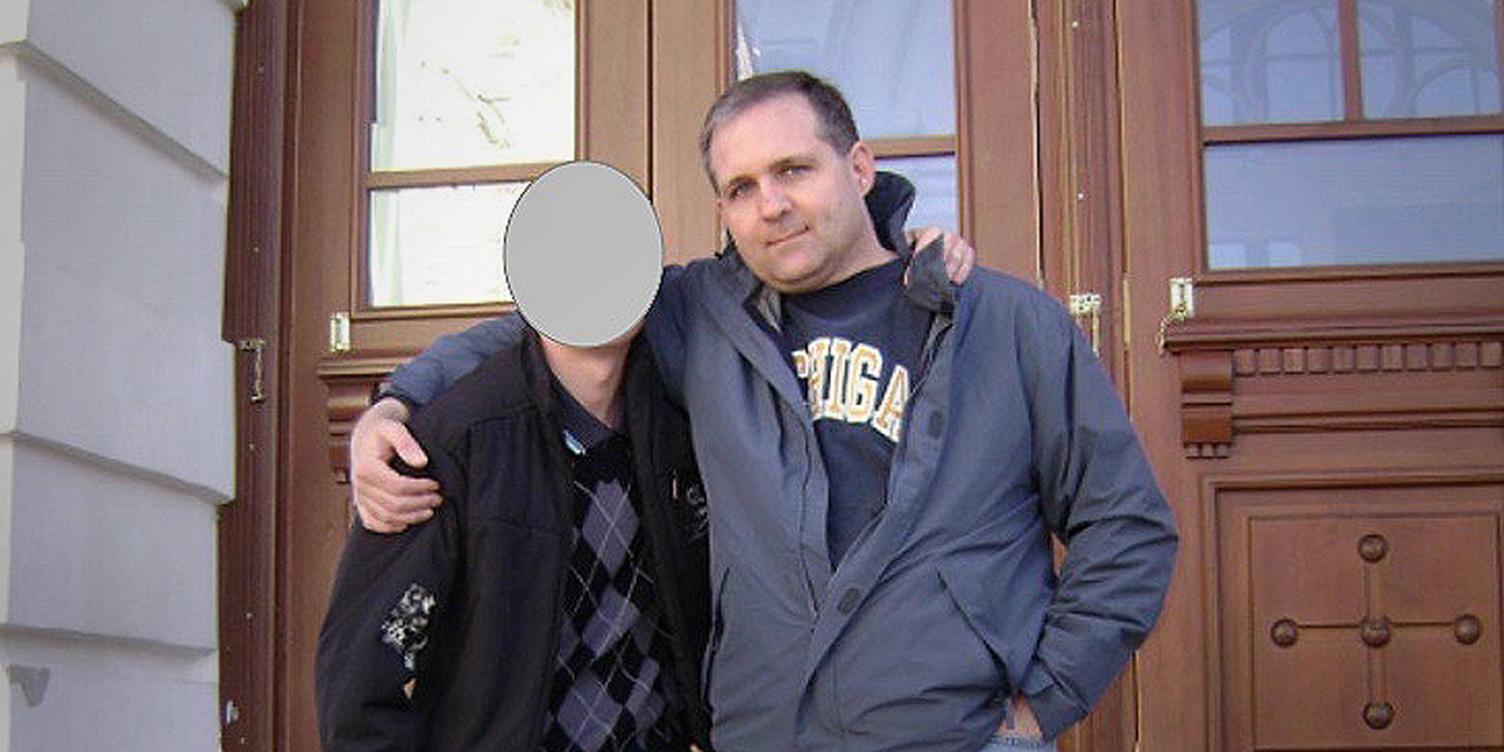
Paul Whelan photographed with a friend
Another man gave his friend a sightseeing tour of his own town that same year. He has no apparent link to the military himself and joked to me via VK that the American "didn't request to see anything suspicious :))"
A Moscow hairdresser, meanwhile, was contacted by Whelan on Instagram around five years back. They talked about foreign travel and never met.
One VK friend still in the military told me the American first messaged when he was a cadet and the two have chatted online two or three times a week ever since.
"He seemed nice and was fascinated by our country, its history and our traditions and people!" the man replied to my enquiries, adding that his own interest was in the ex-Marine's time in Iraq.
He had no idea his friend had been arrested. "No way? He's the kindest soul! If he's a spy, then I'm Michael Jackson!!!!" he wrote.



Betrayal?
The man Whelan accuses of framing him was one of his oldest friends in Russia. He is also a serving intelligence officer.
Defence lawyers disclosed some details of the men's relationship early on in the case, including how the American had visited his friend's house in Sergiev Posad outside Moscow for "saunas and kebabs" the winter before his arrest.
They also said he owed Whelan around 80,000 roubles ($1,147; £930) which the FSB claimed was advance payment for intelligence. The defence team said the Russian had requested a loan to buy a gift for his wife, as part of his trap.
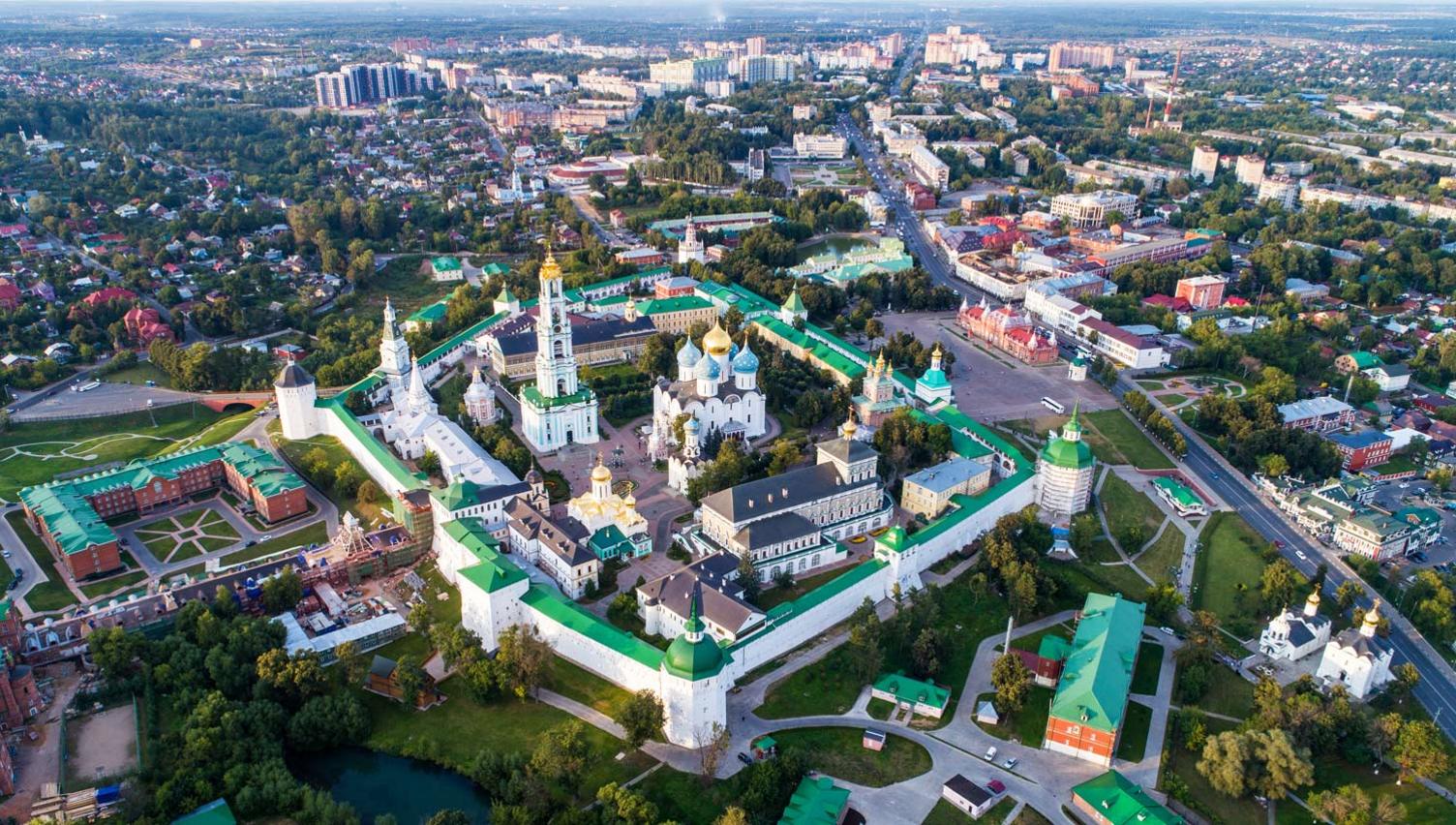
The town of Sergiev Posad is home to the spiritual centre of the Russian Orthodox Church - the Trinity Lavra of St Sergius
The Whelan family eventually found a name and even a photograph.
As he still works for the FSB, I can't identify him so I'll call him "Dmitry". But Whelan chatted openly to relatives on email about his friend, including which "FSB school" he'd attended.
'''Dmitry' says hello!", Whelan breezily told his parents after one Facetime chat with the Russian. It seems unusual behaviour if he was trying to recruit the man for US intelligence.
It's possible he even introduced his parents to "Dmitry" on their 2009 trip to Russia, they can't be sure.
In messages home from Moscow in January 2018 - a free holiday to use up his air miles - the American described visiting restaurants with his agent-friend, as well as the museums of the Kremlin and even a British pub.
A year later, just days before his arrest, Mr Whelan took "Dmitry" and another man for Christmas dinner at a restaurant opposite his hotel. He snapped a picture of his guests, "Dmitry" smiling with a glass of wine and his fork raised over a juicy steak.
Labelling it "Dinner with Tovarishi", or comrades, he messaged the image to a third Russian friend - even as he was supposedly discussing how to transfer classified intelligence.
"It all sounds incredibly naïve now," his brother concedes of the relationship, after finally obtaining the passwords for Paul's computers and trawling through his files.
He says his brother's VK messages were deleted after his arrest.
"He has friends in other countries with a military background, I think it was a social thing," David Whelan argues. "The FSB thing wasn't a big deal, until he was entrapped."
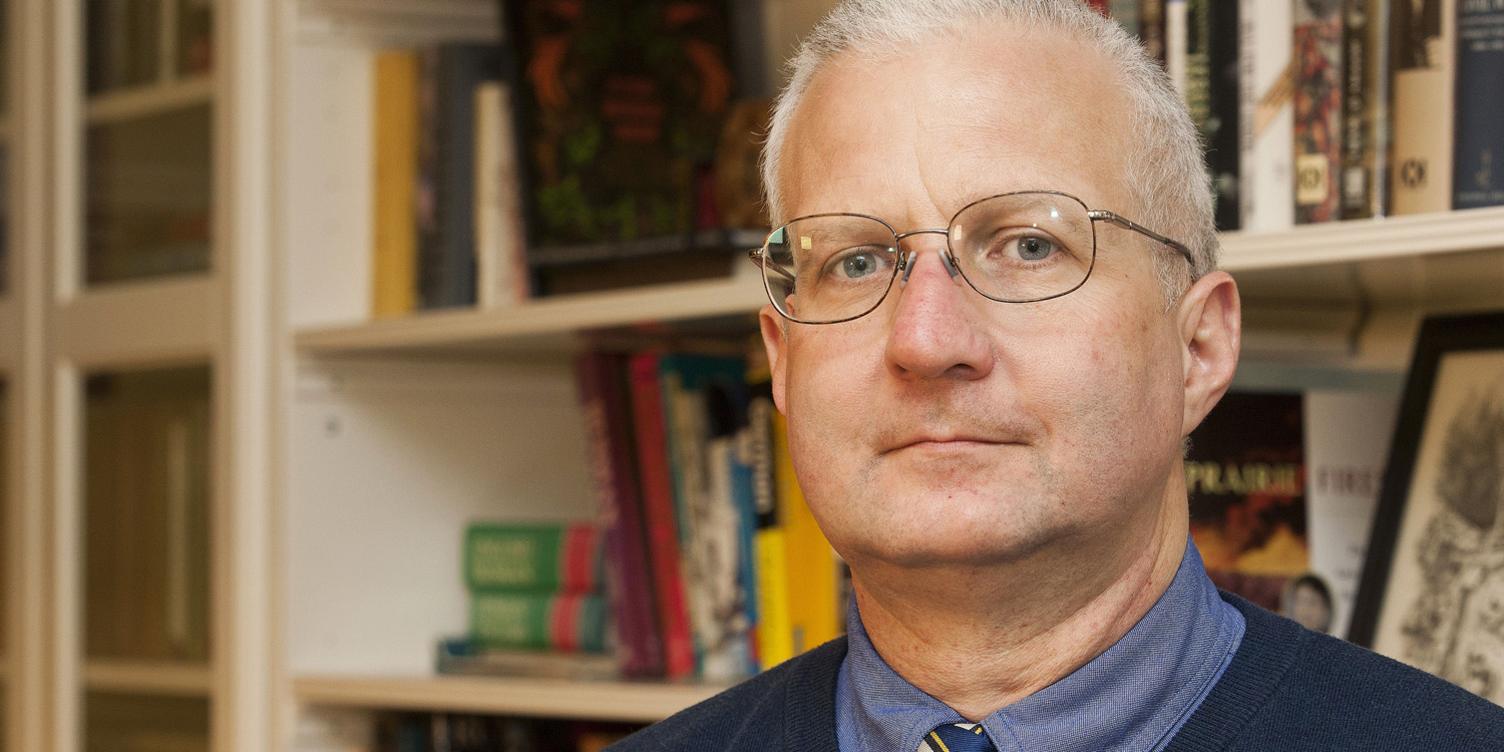
Paul Whelan's twin brother David
Paul Whelan's lawyers have now confirmed that he was being watched for some time and his communications monitored.
A recent newspaper report claimed that the American had come to FSB attention over a decade ago when, as Kommersant's source says, he "actively" began contacting Russian servicemen.
But the espionage case was based entirely on Whelan's ties to one officer, with all the evidence gathered in 2018 shortly before his arrest.
"Had this been an independent court, they would have reached only one decision - not guilty," his lawyer, Vladimir Zherebyonkov said after the verdict. He said the evidence was only ever examined by "incompetent and interested parties".
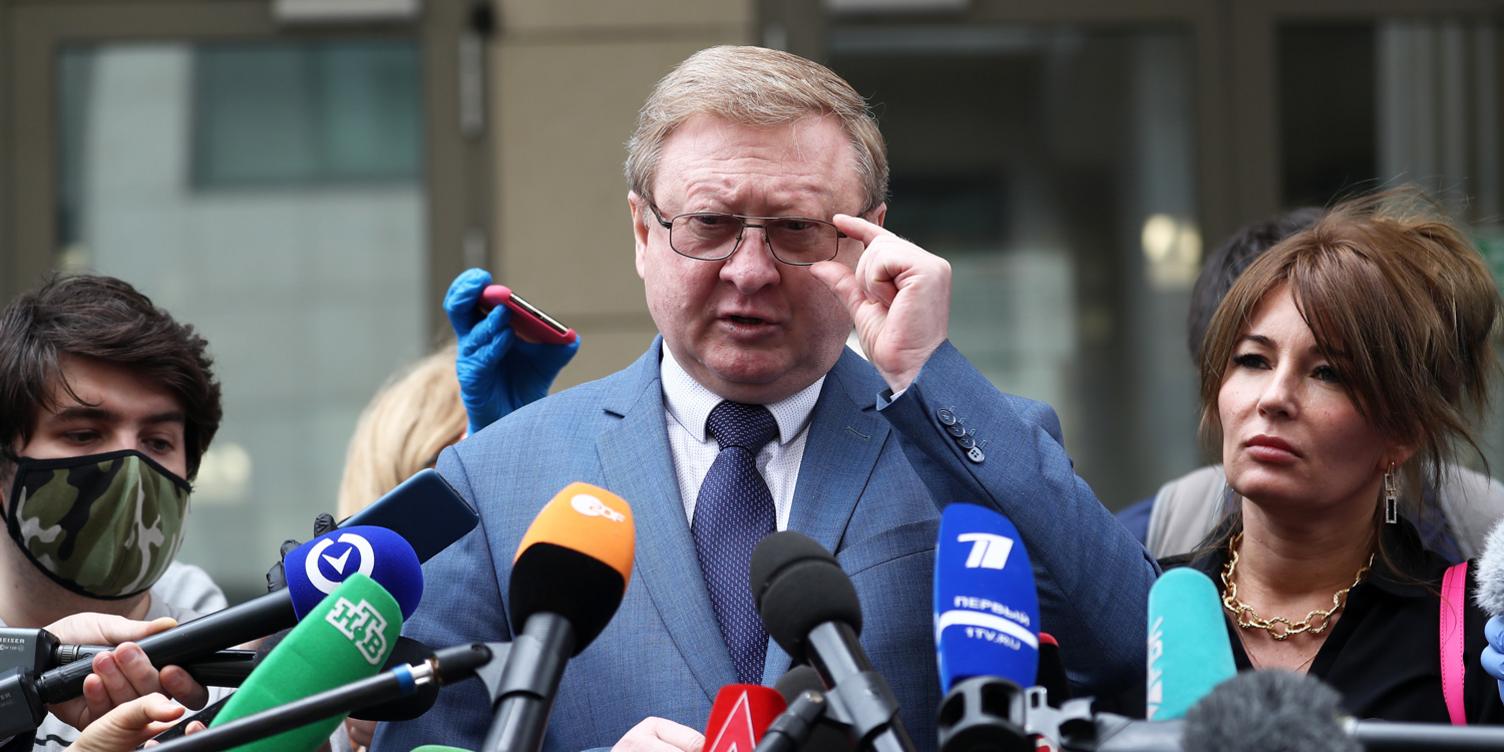
Paul Whelan's lawyers Vladimir Zherebyonkov and Olga Karlova
Ivan Pavlov believes Whelan's claim he was framed is "always possible" with FSB intelligence officers.
"The temptation is high: to rise in rank; for promotion; for more stars on your epaulettes," the lawyer says. "This is how FSB careers are made; people rise on the back of such cases, like mushrooms after the rain."
Officers typically bide their time, he explains, calling it "calf-rearing", before a target is culled.
If so, it appears that Paul Whelan was blind to the threat.
In one email exchange during his early 2018 trip to Moscow, a relative joked: "Don't get into any trouble we can't get you out of, haha!"
"I will be with guys from the FSB, so should be okay!", the American wrote back.



Spy mania
The surge in East-West tensions has made espionage both more complex - and more urgent - in recent years.
After the Salisbury poisoning in early 2018, more than 100 Russian diplomats identified as intelligence agents were expelled from embassies around the world in a co-ordinated act of protest. Russia responded with a mirror mass expulsion of Western diplomats.
At the time, one ambassador told me the move had hit Moscow's spying capacity hard. But the same is presumably true in reverse.
There were signs of problems even earlier.
Almost exactly a year before Paul Whelan's arrest, a Norwegian staying at the same central Moscow hotel was arrested and charged with espionage. A retired border guard, Frode Berg admitted to delivering envelopes of cash and spy instructions on behalf of Norwegian military intelligence agency.
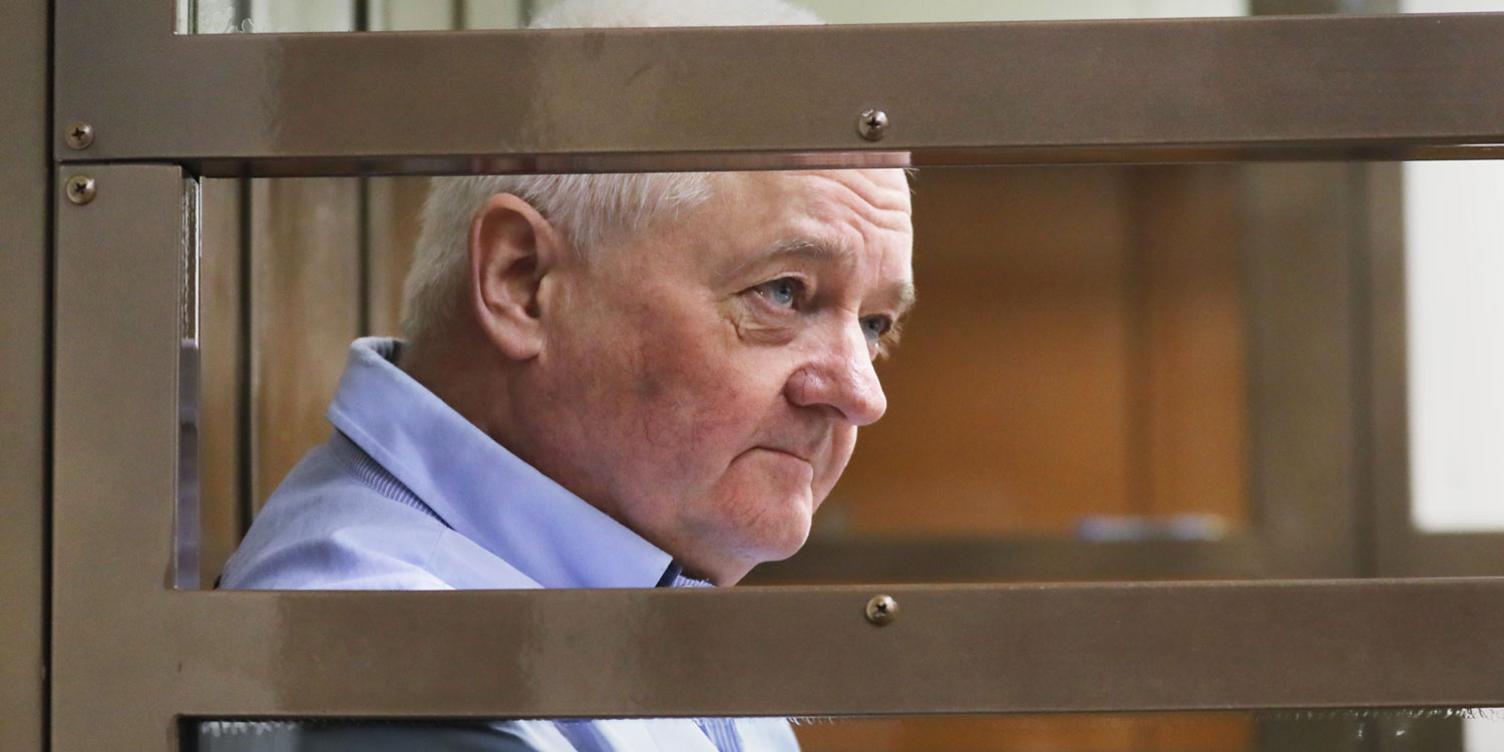
Norwegian citizen Frode Berg in a Moscow courtroom, January 2019
His arrest and 14-year prison sentence caused a scandal back home when it emerged that civilians with no diplomatic cover were being used for high-risk espionage. There were even allegations that Norway was under pressure to obtain the information from its partners in Nato.
Former CIA officers have dismissed any suggestion that Whelan could be involved in something similar, operating without diplomatic immunity: the idea, floated by one retired Russian officer, that his arrest was a "great failure" of US intelligence.
The US Embassy and government have been very vocal about Whelan's detention. "Paul Whelan is innocent," Ambassador John Sullivan told me emphatically last week, calling the trial a "mockery of justice".
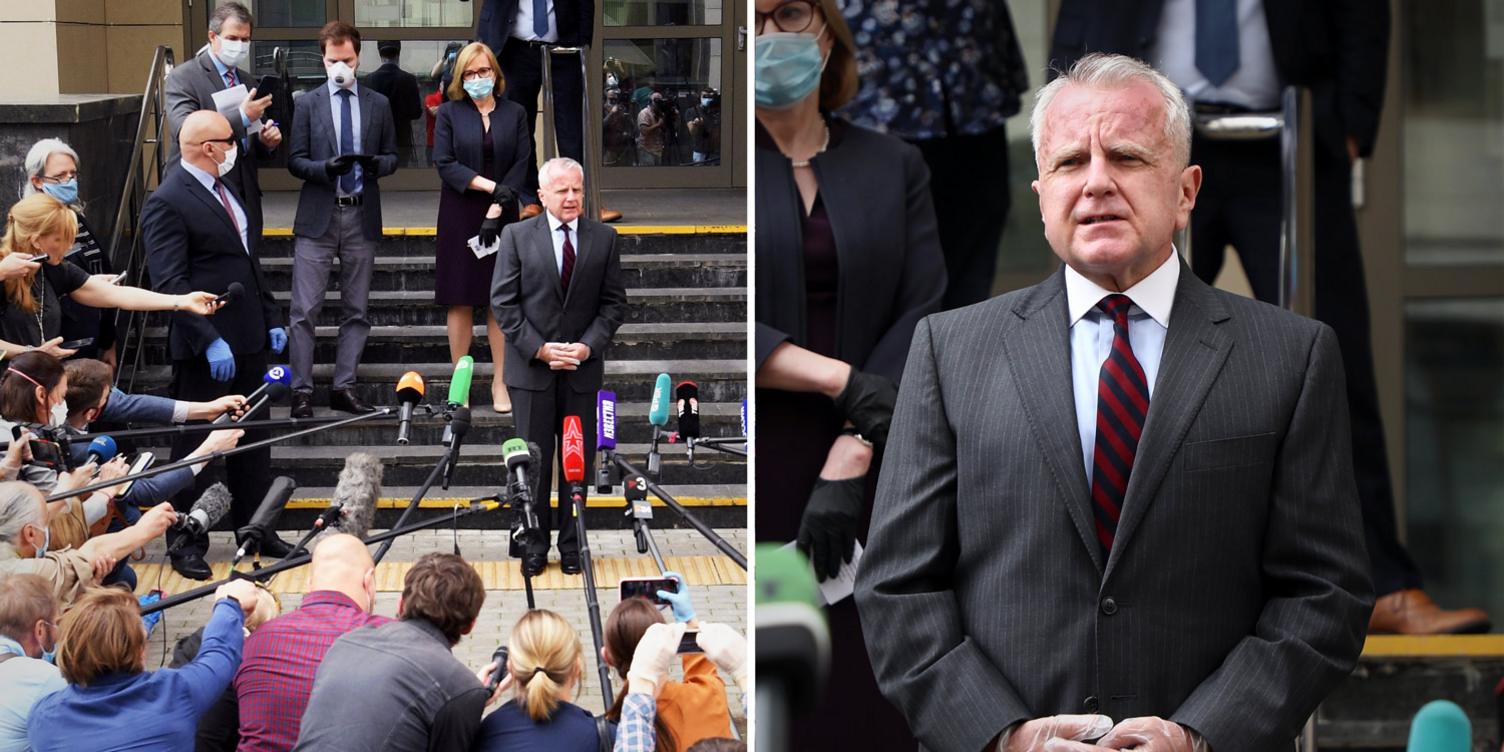
US Ambassador John Sullivan outside court after Paul Whelan's sentencing
In Frode Berg's case, the Norwegian government stayed quiet.
And while Paul Whelan's dishonourable discharge from the Marines shows there are parts of his life of which even his family have no idea, his supporters point to the theft charge as a positive.
"The intelligence community would never use someone with that past, especially in a situation like this when you'd be sent into a very, very difficult environment," argues Ryan Fayhee, the family's lawyer in the US who cites intelligence contacts from his days prosecuting cases of counter-espionage.
"It just wouldn't happen," Fayhee believes. "Trust is the most important thing when you are out there, living on the edge."



Lefortovo life
Perhaps Whelan enjoyed the element of danger that came from flirting with the FSB, hanging out with intelligence officers.
One friend who didn't want to be named told me he was "a little quirky", and liked to "push the line a bit". He wondered whether some comment, or joke might have been disastrously misconstrued. Whelan's own defence lawyer once hinted at that possibility.
Skotti Fietsam, his former colleague, found Whelan serious and supportive, but also laughed at how he would insist on using heavily armed guards when he visited the factory she managed in Mexico, even posting them outside restaurants while they ate.
"I don't know if it was machismo; to show off," Fietsam said. "But it was very unusual."
On Whelan's old website, alongside Harry Potter books and War and Peace, his recommended reading includes a long list of Cold War thrillers by Tom Clancy.
But there's nothing glamorous about prison life in Lefortovo.
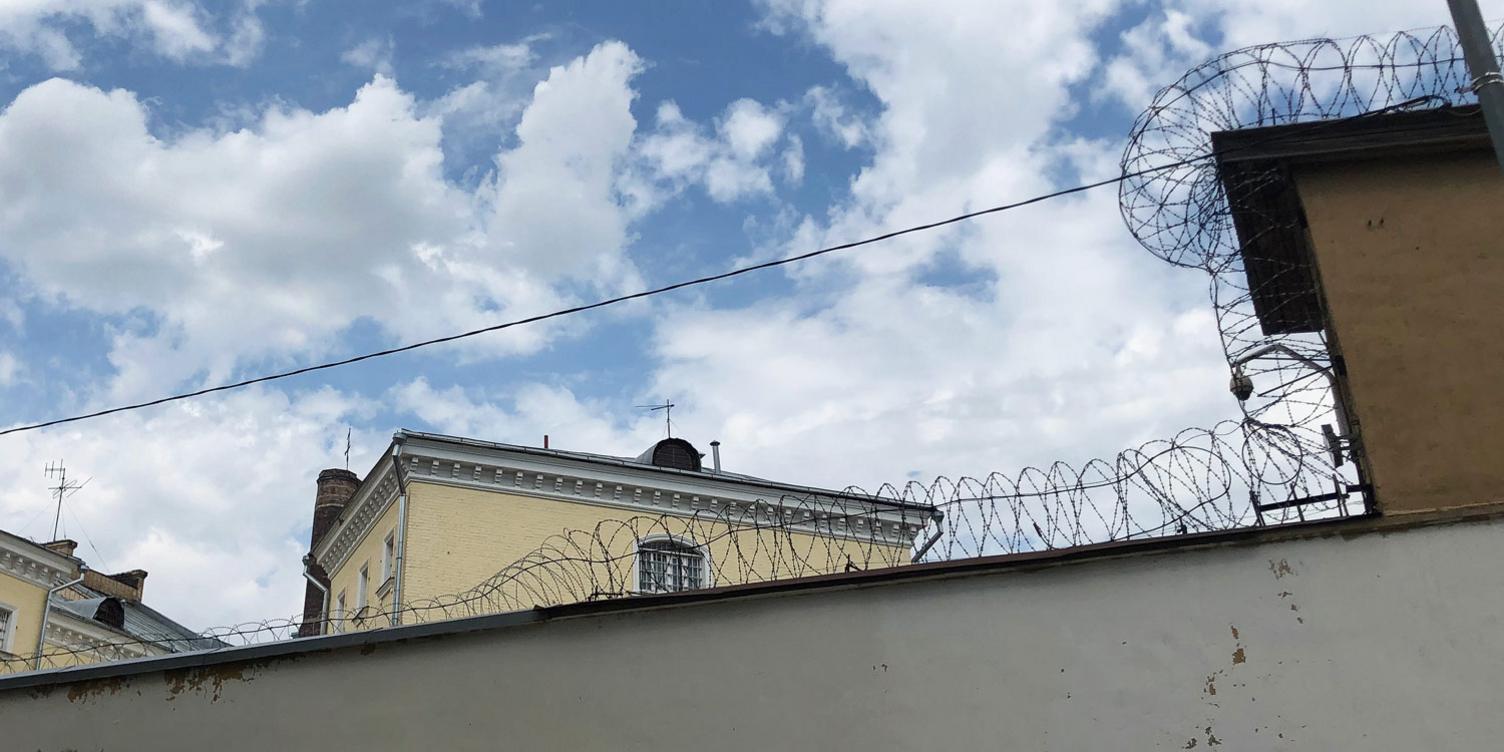
The high wall and barbed wire of Lefortovo jail
"The porridge, some days it goes direct to the toilet," Frode Berg wrote to me from northern Norway of life in the FSB prison. He's now back home after a prisoner-swap.
His own cellmate in Lefortovo used to joke that the inmates were fed dog food in the mornings.
"We never see or meet other prisoners. When we go to a meeting, prisoners were hidden from each other," Berg describes the lonely routine of life inside the K-shape jail, whose tall outer walls now butt-up against Soviet apartment blocks.
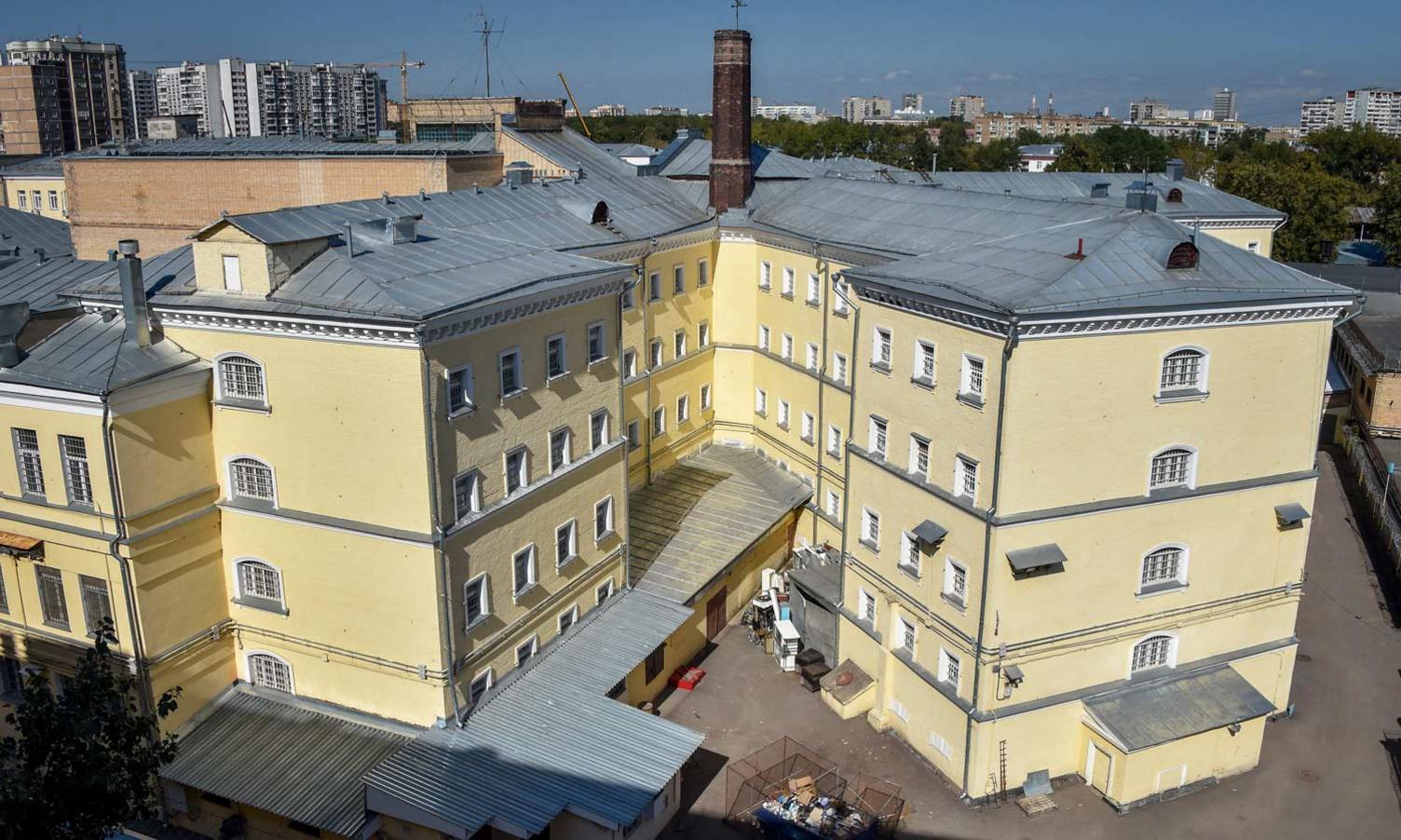
The K-shaped buildings of Moscow's Lefortovo prison
Paul Whelan is being held in the renovated wing, where the Norwegian says there is hot water in the cells now as well as a fridge, TV and toilet. But the space measures 9.5 square metres between two prisoners and exercise is one hour a day on the roof.
Cellmates get to shower once a week, together, in the basement. One light remains on in the cell 24/7.
Whelan and his family say letters have been held back for months by investigators and parcels returned. He wasn't allowed a phone call home for 16 months. And adding to his discomfort was chronic pain from a hernia that eventually strangulated, resulting in emergency surgery.



Swap-shop?
Sentenced to a high-security prison, Paul Whelan won't be leaving Lefortovo just yet.
His lawyers do plan to appeal against the verdict but other, bigger forces are already at play. The minute the American was convicted, the focus shifted to a possible prisoner swap.
"They want Yaroshenko and Bout, that's who they want back," Paul Whelan claimed, naming two high-profile Russian prisoners in America as the court bailiffs ushered me and my microphone out of the room. "That's the only reason they've done this," he alleged.
Lawyer Vladimir Zherebyonkov was soon saying the same, now claiming the FSB had been planning a swap all along.
"No-one's hiding that, everyone talks about it, all the officials," he told the press.
So the prisoner who has always called himself a political hostage is now looking to the politicians to do a deal for his release.
All the signs so far suggest Moscow is opening with a high bid - Viktor Bout, a weapons dealer serving 25 years in America and Konstantin Yaroshenko, sentenced to 20 years for drugs smuggling.
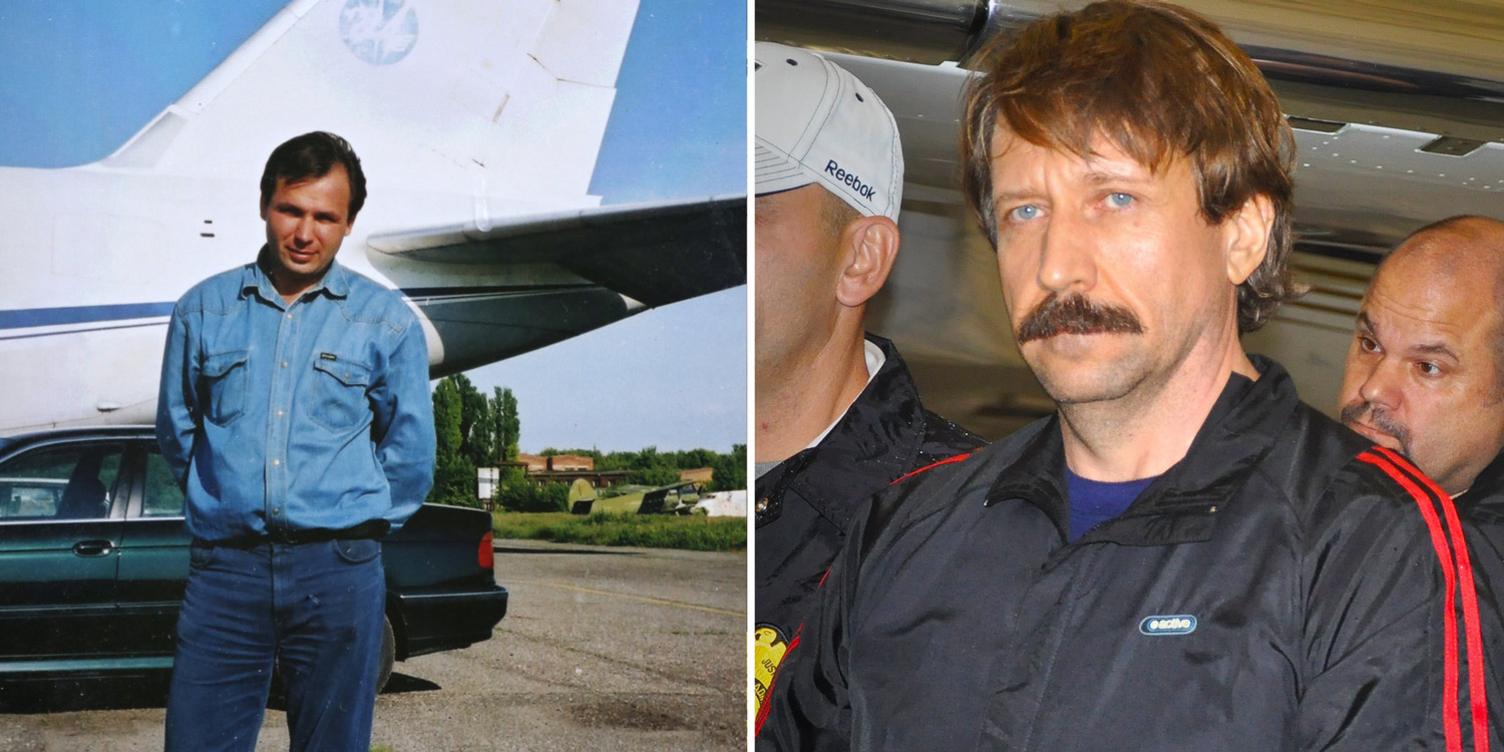
Undated photo of Konstantin Yaroshenko (left) and Viktor Bout in 2010
On Wednesday, the Foreign Ministry spokeswoman called on Washington to show "humanity" and release Yaroshenko "and other unjustly convicted" Russians.
The US has said repeatedly the two men were convicted in open and fair trials.
"We are not looking for an exchange, we are looking for justice for Paul," US Ambassador John Sullivan insisted, emerging from the verdict at Moscow City Court to a wall of microphones and cameras.
Whelan's family are already pushing for action after a sentence that his brother, David, called "a gut punch'.
But he knows it took months of complex, confidential diplomacy to arrange a suitable swap for Frode Berg that eventually involved Russian agents in prison in Lithuania. Norway wasn't holding any convicted spies to trade and neither is America.
"I'm trying to focus on immediate goals, so I don't get distracted by how awful it is that he could spend 16 years behind bars," David Whelan told me, imagining how his twin would have felt, convicted of spying and heading back to his prison cell.
"I think Paul will be taking it very hard. It is an extraordinarily long time."
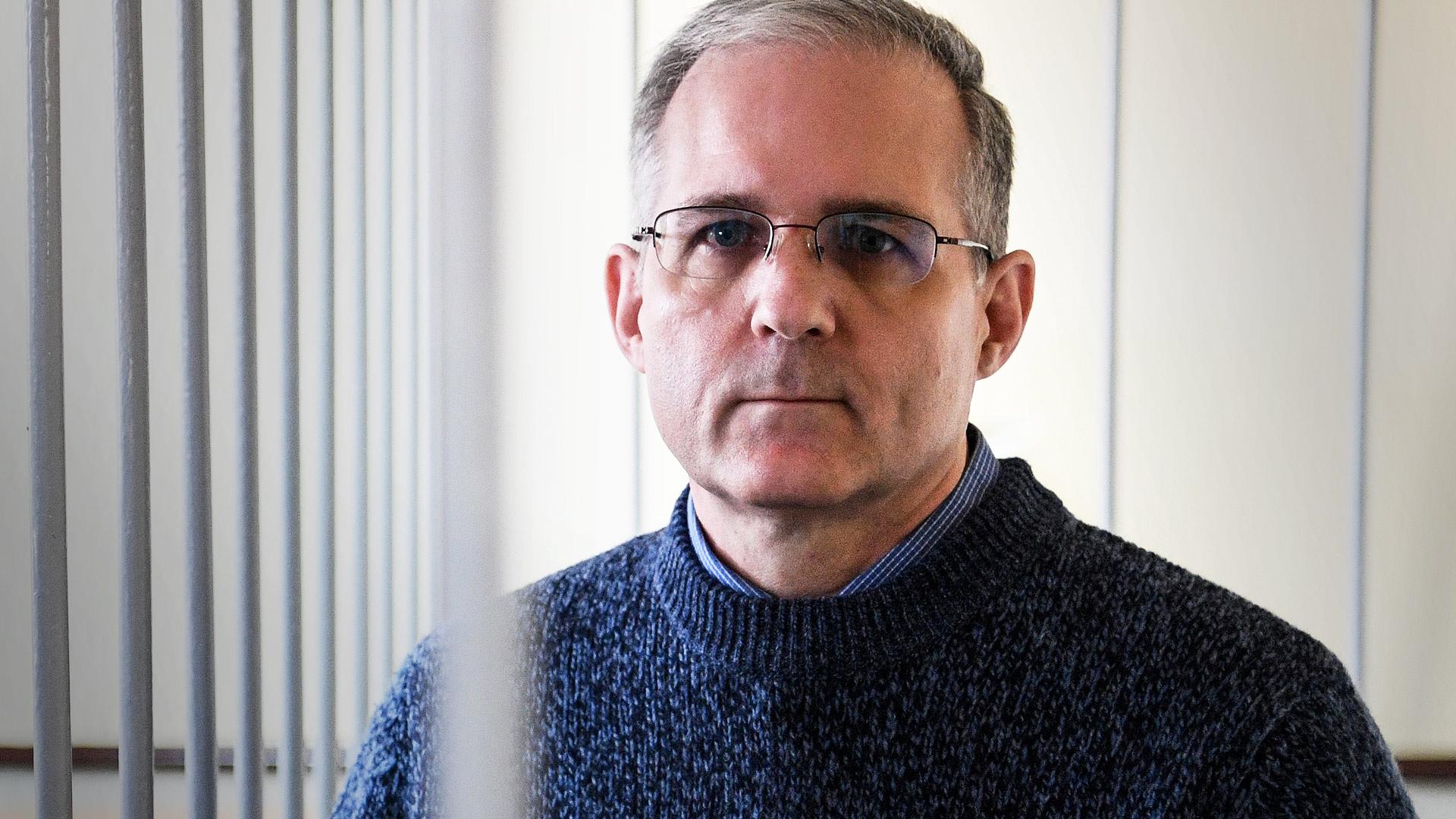
Paul Whelan
- Published15 June 2020
